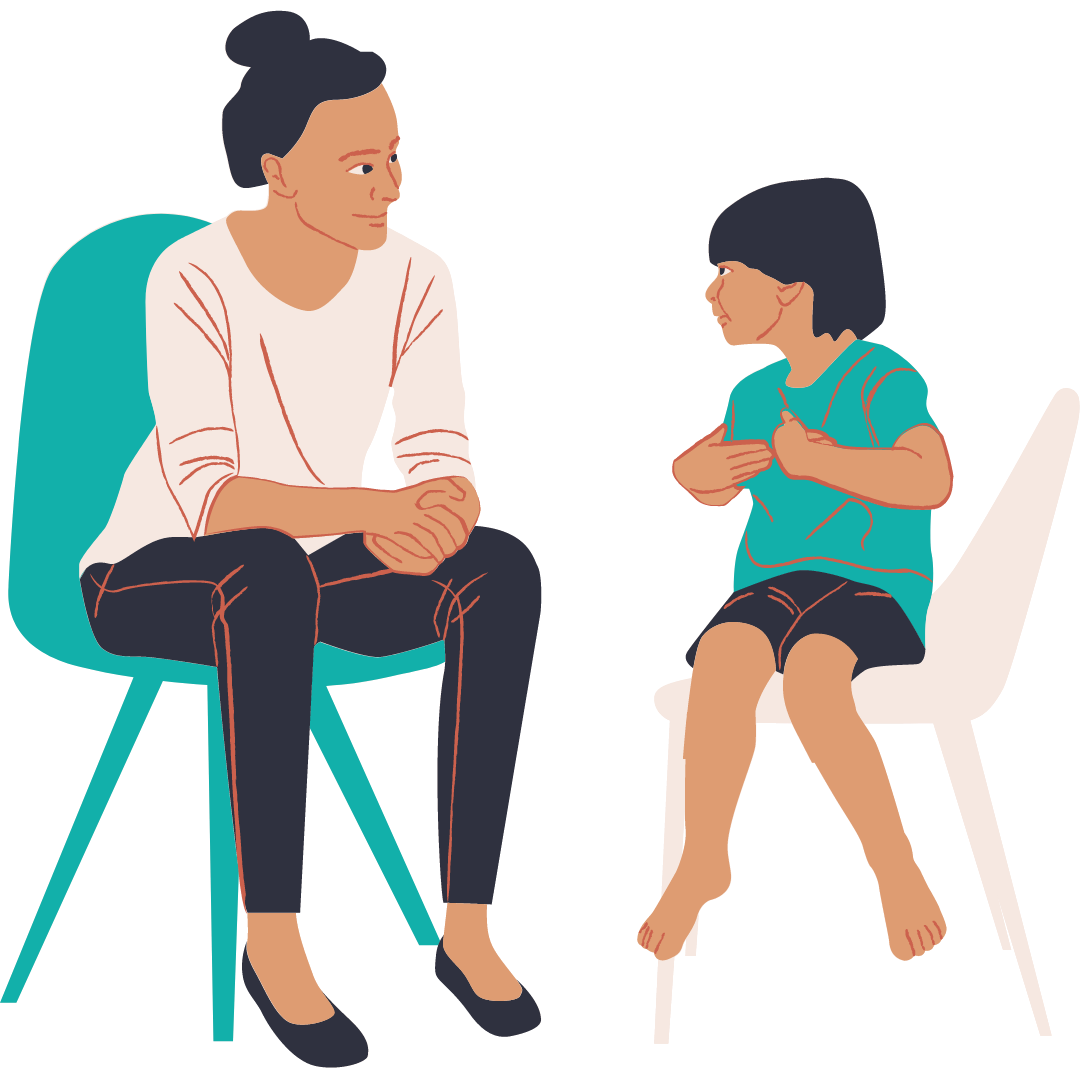How Should You Talk to Your Children About Divorce?
It is a challenging conversation for a parent - speaking to their child about divorce

Parents cannot shield their children from experiencing some suffering from an impending divorce.
They can, however, take steps to mitigate the negative consequences that divorce often has on children.
Communication with the children may be an essential part of planning for a divorce with children.
This article discusses common ways children react to divorce and how parents' communication styles can help their kids cope better.
Ideally, both parents should be present
It is so much better for both parents to be present when the discussion occurs.
Although there is no way to make the discussion perfect, both parents present communicates to the children that this event does not have to come with hostility.
The parents will work together to make the best of the situation.
Use age-appropriate language
Many trauma-informed health care providers screen their patients with the Adverse Childhood Experience (ACE) Assessment or similar questionnaire.
These trauma-related screening tools recognize divorce as a traumatic experience due to the research-backed consequences on most children.
Children often face psychological stress and academic challenges.
A divorce or separation does not have to cause long-term trauma for a child.
Consider multiple factors, such as your child's emotional maturity, when preparing to discuss divorce with them.
Can your preschooler comprehend a divorce? Probably not.
Children between the ages of three to five years old have a limited ability to attach meaning to the world around them.
Children in this age group believe the person dressed up as Mickey Mouse at Disneyland is the real deal or that the moon follows them on car rides.
They cannot wrap their innocent minds around their parent's marital breakdown. Processing this information is hard enough for adults. There is not enough life experience at the preschool age to even start the processing.
Simple explanations and instructions are likely best.
For instance, "Daddy lives in another house now but will still see you every week" may work well for a preschool-aged child.
Also, seek out children's books. A children's book like Claire Masurel's Two Homes can help your child absorb their new normal in terms they understand.
Elementary school students attempt an understanding of divorce
Children between the ages of five and ten are more independent than their preschool peers.
They have more opportunities to develop relationships outside of their household and learn vocabulary to express their feelings.
Nonetheless, they cannot comprehend complex situations like divorce or a trial separation.
Elementary-school-aged children tend to view the world through black-and-white lenses.
For example, they might think that one parent is solely to blame or that a single event like forgetting to take out the trash caused the breakup.
Let your child know that it is okay to ask about divorce by initiating the topic and patiently addressing their misconceptions as they come up.
Without divulging intimate details, you could reassure your child that the divorce is not their fault and that they will not be able to bring their parents back together.
You could speak about children generally, such as "some children feel confused and worried when their parents break up. These feelings are normal to have."
This approach validates and supports a child's feelings without putting them on the spot.
Middle schoolers typically distance themselves
Children between the ages of 11 and 13 can usually understand some parts of the divorce or separation process.
Brace yourself because they might question your authority as a parent or your decision-making as a spouse.
Your middle schooler will likely create space with you and turn increasingly towards their social circle for support.
Regardless of your child's behavior, maintain a nurturing environment and extend an open invitation to discuss their feelings.
For example, "You won't hurt my feelings by saying what's on your mind. I'm here if you ever need to check-in."
Divorce will not be a one-time chat but an ongoing conversation as your child gradually adjusts.
High schoolers are vulnerable
High school is notoriously challenging.
A nationwide survey found that 75% of high school students reported feeling "miserable," "tired," or another negative feeling about school.
Throwing a divorce into the mix could push the average teenager over the edge.
Researchers found that teenagers of divorced parents are 1.5 to 2 times more likely to engage in high-risk behaviors like suicide attempts and substance abuse.
Regardless of how mature your teenage daughter or son thinks they are, the brain's rational part does not fully develop until around age 25.
The teenage brain relies on the emotional part of the brain and acts more on feeling than thinking.
Teenagers commonly react to divorce with mixed emotions. On the one hand, they might feel relieved at less conflict in the household but angry because one parent is less present.
Usually, teenagers live in the moment.
A parent could help them grapple with the divorce or separation by preparing for the future together.
For instance, a parent could include their teenage child in some decisions related to their wellbeing, such as deciding where to spend the holidays.
The parent will continue to have final decision-making authority, remain cautious of what information they disclose, and provide a safe space for teenagers to express themselves.
A parent could ask their teenager, "Do you want me to offer advice or just listen?" and not push for answers.
Adult children still need reassurance
Loving mothers and fathers know that a parent never stops parenting their child.
According to the Pew Research Center, an adult aged 50 and older is about twice more likely to get divorced today than in the 1990s.
The rise in "gray divorces" means that more people are adults when their parents separate or divorce.
Divorce affects adult children and young children alike but in different ways.
For example, a parent might lean on their adult child for emotional support, financial support, or both.
This enmeshment could look like a parent oversharing intimate details about infidelity or asking to move in with their child.
Unlike small children, courts do not enforce a parenting schedule with adult children.
Adult children of divorce often juggle spending time with parents, reconciling feelings of resentment and guilt, and mourning the loss of the family they once had.
A parent could reassure their adult child that the divorce had nothing to do with them and, if possible, that the marriage didn't last as long as it did for "the children's sake."
Similarly, a parent could express that their family life growing up was not a lie.
Just as with younger children, a parent should be sensitive to their adult child's feelings.
For example, an adult child may grieve the family home despite not living there for years because of the memories it holds.
Despite the adult child's increased emotional and mental capacity, a parent should avoid trauma dumping and take full ownership of their healing.
Reassure your children they come first
Do your child a favor by not speaking poorly about your spouse or spouse's family. This restriction promotes amicable co-parenting.
It also avoids making your child feel like they have to choose sides or play mediator.
Regardless of age, your child will likely turn to you as a model for conflict resolution and replicate your behavior in their everyday lives and relationships.
Stick to the boundaries you set
Although you may not be able to lean on your ex like before, you are both on the same team for the children.
Anything you do or say should be for the betterment of your children.
Aim to do the following:
- Refrain from divulging specific details to your child, whether your new dating life or your experiences with the other parent.
- Adopt a neutral tone when speaking to your ex about the children.
- Remain consistent with discipline and expectations for your child.
- Avoid using your child to spite or compete with your ex.
- Resist asking your child about your ex-spouse's personal life or how their side of the family is doing.
Any parent who cannot stick to boundaries should consider outside help to prevent negatively affecting their child or children.
For instance, parents could use a co-parenting app like OurFamilyWizard or TalkingParents to improve communication.
Additionally, parents could speak to a family law attorney about parallel parenting. Under this model, parents care for their children independently and limit communication to urgent matters.
Therapy may help everyone involved

Researchers have extensively documented the potential consequences of a divorce on a child's development and life trajectory.
You could increase the likelihood of your child successfully coping with the stress of divorce or separation by working with a professional.
A therapist or other mental health professional could provide tips on setting boundaries with your spouse, communicating with your child, and establishing a routine.
They could also tell you how to identify behavioral red flags and how to support your child.
For example, a child might start bed-wetting due to stress caused by their parents' relationship.
A mental health professional could advise you to shield your child from conflict, encourage the child to have friends, and avoid misinterpreting maladaptive coping mechanisms as "acting out."
They could also help you and your child move through the various stages of divorce without resorting to conflict, name-calling, or self-destructive behavior.
Counseling before, during, and after a divorce could help the family make sense of these uncertain times and limit the children's psychological trauma.
Attorneys and mediators could facilitate communication
Working with an attorney or mediator could help you avoid making choices against your children's best interest.
A mediator does not offer legal advice but helps spouses reach an agreement on their separation or divorce issues.
Reaching consensus in a safe space guided by a neutral mediator can help avoid conflict in front of or near the children.
Mediation could be helpful when dealing with a high-conflict parent, such as a narcissist or addict.
An experienced family law attorney could help you make informed decisions about your children and marriage by explaining your legal options and rights.
Prioritize your child's well-being
Divorce can significantly impact your quality of life, relationships, and parenting. Be patient with your children and yourself as you make the best of this life transition.
When in doubt, comfort your child.
The soothing effects of a sincere "I love you" do not have an expiration date.
Your child at any age benefits whenever you validate their feelings and consider them in your decisions.
We hope you enjoyed this article.